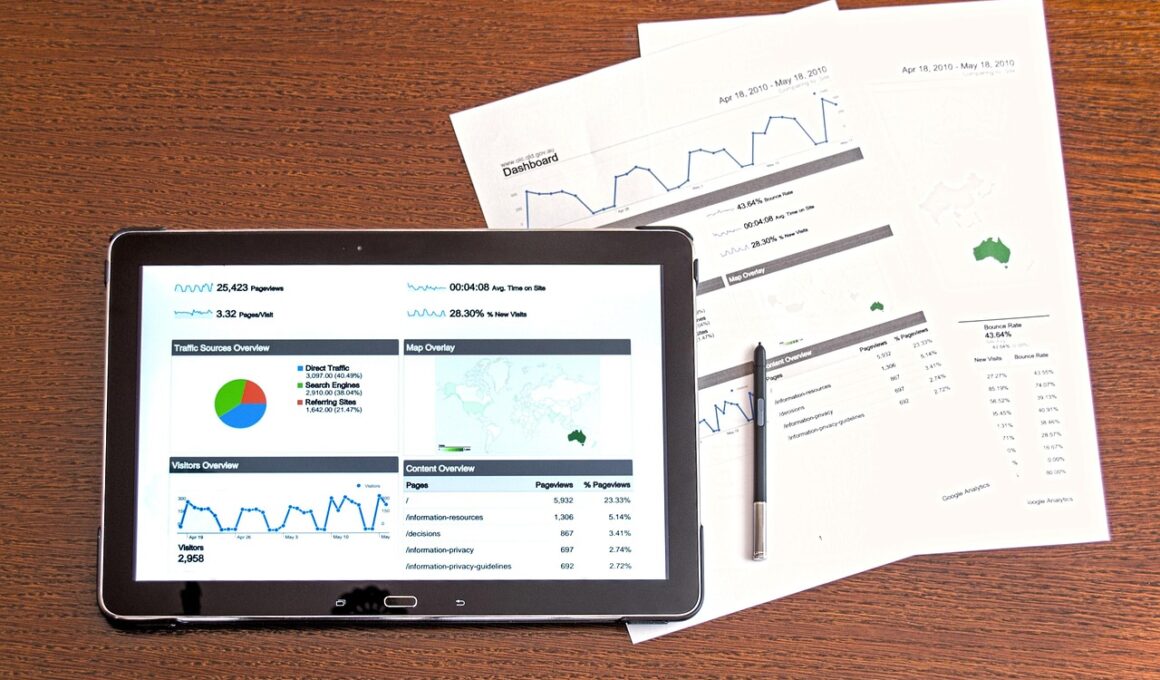Leveraging Data Analytics for Market Research in B2B
Data analytics has increasingly become essential in B2B marketing strategies. With businesses continuously seeking to understand their market dynamics, leveraging data analytics allows for nuanced insights into customer behavior and preferences. Key data sources include customer databases, social media interactions, and industry trends. Utilizing advanced analytics can help in segmenting customer profiles, predicting future buying behaviors, and tailoring marketing efforts accordingly. Moreover, the use of big data enables businesses to identify emerging market trends and areas for growth. Implementing data-driven decision-making can lead to improved alignment between products and market needs, fostering stronger partnerships. Analytics not only aids in optimizing current strategies but also enhances long-term strategic planning. By adopting a multifaceted approach to data collection and analysis, companies can ensure they remain competitive. In essence, the power of data analytics transforms the way B2B organizations approach market research, taking intuitive guesswork out of the equation and replacing it with concrete, actionable insights that fuel growth and innovation.
The Role of Big Data in Market Research
Big data encompasses large volumes of structured and unstructured data that B2B marketing teams can analyze for better insights. The role of big data in market research extends beyond mere collection; it hinges on the ability to extract meaningful information efficiently. Businesses can utilize advanced tools and analytics software to sift through various data types, including qualitative data from customer feedback and quantitative purchase data. This data intelligence provides a holistic view of market behavior. Moreover, applying machine learning algorithms enables organizations to identify patterns and improve predictive analytics. Organizations can leverage these insights for market segmentation, targeted marketing, and ensuring their product offerings align closely with market demands. Integrating big data analytics into market research aids in making informed decisions about pricing strategies, promotional campaigns, and product development. Additionally, businesses can continuously refine their strategies based on real-time feedback, ensuring that they remain adaptable to market shifts. Overall, big data serves as the backbone of an effective market research strategy, driving enhanced targeting and customer engagement.
To effectively leverage data-driven insights, businesses should prioritize the establishment of a robust data governance framework. Such frameworks ensure data accuracy, quality, and compliance, enabling marketers to trust the data utilized for decision-making processes. Data governance involves policies that dictate how data is collected, stored, and processed, emphasizing security and ownership. Companies must ensure the proper training of personnel involved in data handling and analysis, empowering them to fully utilize the available tools. Additionally, investing in data analytics platforms can streamline the analysis process, enabling teams to visualize complex data sets easily. Visualization tools make it simpler to communicate insights and actionable recommendations to stakeholders, promoting a data-driven culture. A critical aspect of data governance is maintaining regular audits of data sources and analytics processes, ensuring that all practices remain aligned with the changing compliance landscape. By adhering to established data governance principles, B2B organizations can maximize their investment in data analytics, leading to improved strategic alignment and business outcomes that drive growth. This commitment to data integrity fosters trust, enhancing collaboration within the organization and with partners.
Transforming Insights into Actionable Strategies
Transforming insights garnered from data analytics into actionable marketing strategies requires a systematic approach. It is essential for B2B organizations to prioritize their objectives, aligning strategies with overall business goals. Being proactive about addressing client needs and market dynamics is critical. Teams should synthesize data findings into precise market positioning statements that resonate with targeted customer segments. Regular collaboration and communication among departments enhance the integration of insights into all marketing initiatives. Implementing integrated marketing campaigns based on analytics outcomes allows for coherent messaging and maximized outreach efforts. Additionally, continual monitoring of campaign performance ensures adjustments can be made in real time. This momentum capitalizes on positive trends while also mitigating any underperforming strategies. Furthermore, organizations must foster a culture that encourages experimentation; testing new tactics based on data insights can lead to rich learning experiences. Ultimately, the ability to rapidly adapt marketing strategies based on actionable insights influences competitive advantage, aligning the business with customer expectations more closely. As B2B markets evolve, agility in strategy execution rooted in robust data analysis is key for sustainable success.
Customer feedback forms a vital component in refining marketing efforts through data analytics. It complements quantitative data by providing qualitative insights into customer experiences and preferences. Survey results, online reviews, and social media interactions can be analyzed to unearth trends related to customer sentiment. Marketers can employ sentiment analysis tools to gauge public perception about their brands, products, and marketing initiatives effectively. By analyzing this feedback, companies can pinpoint the aspects of their offerings that resonate most and those that require enhancement. Implementing mechanisms to collect ongoing customer feedback ensures that companies remain engaged with their audience and responsive to real-time shifts in preferences. Moreover, this feedback loop can bolster customer loyalty and retention efforts. Creating a structured process for integrating customer insights into product development, pricing, and marketing strategies fosters an environment of continuous improvement. Furthermore, responding to customer feedback signals to the market that a business values its clients, enhancing the overall brand reputation. Thus, analyzing customer feedback through data analytics not only informs marketing practices but nurtures meaningful relationships with clients.
The Future of Data Analytics in B2B Marketing
The future of data analytics in B2B marketing appears both promising and dynamic, driven by technological advancements and evolving market needs. Emerging technologies such as artificial intelligence and machine learning are set to revolutionize data analysis capabilities. These innovations can provide even deeper insights into customer behavior, enabling predictive modeling and advanced segmentation. B2B companies will increasingly rely on real-time analytics for decision-making, leading to more personalized customer interactions. Moreover, the integration of Internet of Things (IoT) data enriches the dataset available for analysis, allowing businesses to track customer engagement more accurately. As competition intensifies, organizations that harness this power of data will gain a significant edge. Furthermore, the evolution of privacy regulations necessitates a thoughtful approach to data collection and usage, prompting marketers to prioritize transparency and ethical practices in data handling. Emphasizing responsible use of data will not only comply with compliance standards but also build trust with clients. In conclusion, B2B organizations that effectively leverage data analytics while prioritizing ethics and responsibility will undoubtedly thrive in the future landscape of marketing.
In order to successfully implement data analytics for market research, B2B organizations must foster collaboration between data scientists and marketing teams. This synergy is crucial for translating complex data sets into actionable marketing strategies. Regular inter-departmental meetings should be scheduled to discuss insights, share challenges, and strategize collectively on data-focused initiatives. Such collaboration breeds innovation, as diverse perspectives can yield unique solutions to marketing problems. Additionally, organizations should focus on continuous education and training of staff on the benefits of data analytics. Encouraging a data-driven mindset among all employees, not just those directly in marketing, elevates the organizational capacity to respond to market shifts and customer needs. Investing in workshops and certification programs on analytics tools can empower teams to utilize data effectively. Embracing new technologies and methodologies will enhance the analytical prowess of the organization, resulting in improved overall performance. Creating a centralized hub for data access encourages transparency and collaboration, enabling various departments to collaborate effectively. Ultimately, organizations that embrace a comprehensive approach to data analytics will set themselves up for sustained growth and innovation in the B2B marketplace.


